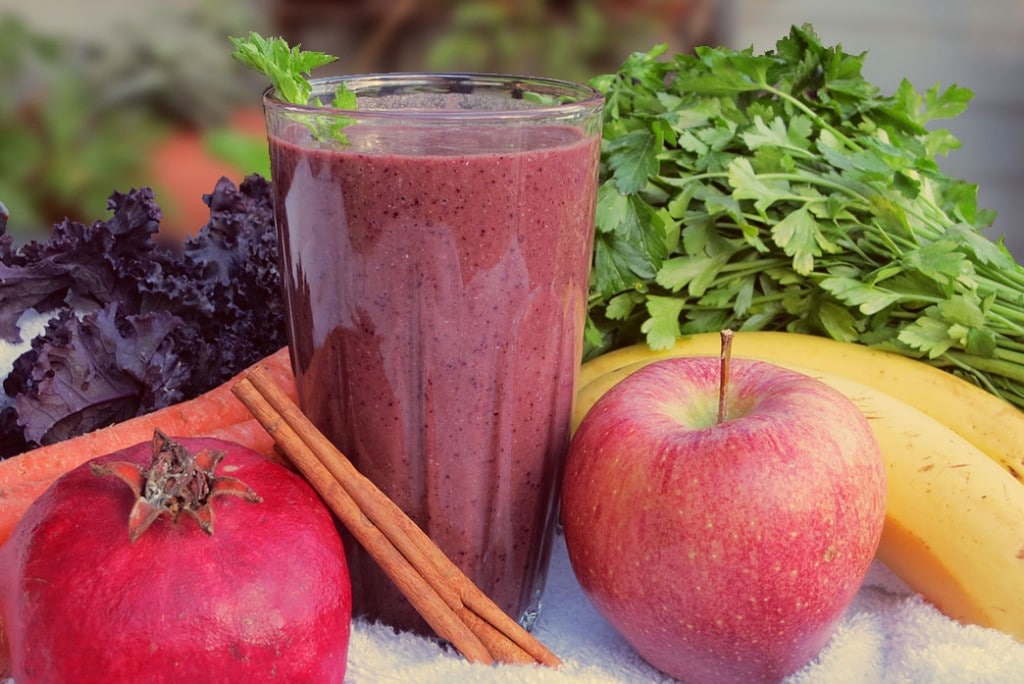Purple Savior Breakfast Blend
The Purple Savior recipe started as a result of purchasing a Vitamix. I can’t say enough how much I like this unit for blending. When I used to juice, I couldn’t stand the act of disposing of all that pulp from my fruits and veges, not to mention losing the nutritional benefits of the of it. Now, I can blend this up in less than 15 minutes and it’s super easy to clean.
For the Purple Savior, I buy everything organic which I do recommend, especially the carrots and apples which are know to have large amounts of pesticides. You can leave the banana out if you want to drop 50 calories and the sugar content. It also makes the drink less thick. The ingredients for the Purple Savior were chosen for their specific nutritive properties. I have to say, I’ve not been sick in a VERY long time. Neither has my partner. That’s why I call it the Purple Savior. It came on the heals of having one of the worst flus I’ve ever had and missing an entire Christmas. I listed all of the health benefits of the ingredients below as well as added a description of different vitamins and minerals.
1 Serving = 16oz, 150 Calories
Recipe makes 2 Servings
1 Cup – Blueberries
1 – Small Apple
1/2 – Banana
3/4 Cup – Purple Kale
1/4 Cup – Fresh Parsley
1-1/2 TB – Fresh Ginger
1/2 TB – Cinnamon
1/2 tsp – Turmeric
1/4 tsp – Black Pepper
1/2 TB – Flax Meal
1/2 TB – Chia Seeds
1/2 TB – Sesame Seeds
1/2 Cup – Pomegranate Juice
1/2 Cup – Coconut Water
1/4 Cup – Walnuts
3/4 Cup – Spinach
1 – Medium Carrot
Fill the rest of the container to 32oz with water
I listed the ingredients in the order that I put them into my 64oz (8 cup) Vitamix container. I usually do a quick blend after I put in the walnuts to reduce volume so I can fit in the spinach and carrots. Note that the recipe above is cut in half (32oz) from when I make the drink. I make it 8 cups at a time which is 4 servings, and I put them into 17oz Rubbermaid containers. This gives us two days of breakfast with only one 15 minute span in the kitchen. Not bad for timing.
- Blueberries
- Vitamins K1, C, ManganeseBlueberries are rich in beneficial plant compounds and antioxidants, especially anthocyanins, which may reduce the risk of heart disease by lowering blood pressure and inhibiting oxidation of LDL cholesterol. Several studies have shown that blueberries may play a role in brain health, delaying age-related decline and helping improve brain function. They do not have adverse effects on blood sugar levels, which may be due to their high content of bioactive compounds. Several studies indicate that blueberries may lower blood sugar levels and improve insulin sensitivity. Blueberries have the highest antioxidant capacity of all commonly consumed fruits and vegetables. Flavonoids appear to be the major antioxidant compounds. Several studies have shown that blueberries and blueberry juice can protect against DNA damage, a leading driver of aging and cancer. The antioxidants in blueberries have been shown to protect LDL lipoproteins (the “bad” cholesterol) from oxidative damage, a crucial step in the pathway towards heart disease. Regular blueberry intake has been shown to lower blood pressure in numerous studies. The antioxidants in blueberries seem to have benefits for the brain, helping to improve brain function and delaying age-related decline. Like cranberries, blueberries contain substances that can prevent certain bacteria from binding to the wall of the urinary bladder. This may be useful in preventing urinary tract infections. Blueberries contains quercetin. High intake of this flavonol has been linked with lower blood pressure and a reduced risk of heart disease. Blueberries also contain Myricetin. This flavonol may have a number of health benefits, and has properties that may help prevent cancer and diabetes.
- Apple
- Vitamin C, PotassiumDespite their high carbohydrate and sugar content, the glycemic index is low, ranging from 29 to 44. The glycemic index is a measure of how food affects the rise in blood sugar levels after eating. Low values are associated with various health benefits. Apples are mainly made up of carbs and water. They also contain fiber, which moderates blood sugar levels and promotes colon health. Apples are high in various antioxidant plant compounds, which are responsible for many of their health benefits. Apples contain quercetin, a nutrient found in some plant foods, shown to have anti-inflammatory, anti-viral, anti-cancer and anti-depressant effects in animal studies. Apples contain catechin,
shown to improve brain and muscle function in animal studies. Apples also contain chlorogenic acid has been shown to lower blood sugar and cause weight loss in some studies. In one study, women who were instructed to eat 300 grams of apples (10.6 ounces or 1.5 large apples) per day lost 2.9 lbs (1.3 kg) over a period of 12 weeks. A few studies indicate that eating apples may help protect against diabetes. There have also been some animal studies showing that apple phytonutrients can protect against cancers of the lungs and colon. - Kale
- Beta-carotene, Vitamin K, Vitamin C, Vitamin B6, Manganese, Calcium, Copper, Potassium, Magnesium, Vitamin B1, Vitamin B2, Vitamin B3, Iron and PhosphorusHigh in antioxidants. Includes flavanoids quercitin and kaempferol which help to counteract oxidative damage, cardioprotective, blood pressure lowering, anti-inflammatory, anti-viral, anti-depressive and anti-cancer effects. Reduces the amount of bad cholesterol in the body, preventing heart disease, and increases the amount of good cholesterol. Includes sulforaphane, a substance that has been shown to help fight the formation of cancer. Contains lutein and zeaxanthin, carotenoid antioxidants which lower risk of macular degeneration and cataracts.
People with thyroid disorders need to monitor cruciferous veges as they contain thiocyanates that can interfere with iodine absorption.
- Parsley
- Vitamin A, vitamin K, vitamin C, vitamin E, B6, B12, Bs (thiamin, riboflavin, niacin, pantothenic acid, choline, folate), Calcium, Iron, Magnesium, Manganese, Phosphorous, Potassium, Zinc, CopperThe health benefits of parsley include controlling cancer, diabetes, and rheumatoid arthritis, along with helping prevent osteoporosis. Furthermore, it acts as a pain reliever with anti-inflammatory properties. Parsley also provides relief from gastrointestinal issues such as indigestion, stomach cramps, bloating, and nausea, while helping to strengthen the immune system.
Avoid excessive consumption of parsley during pregnancy and breastfeeding, if you suffer from kidney stones, or are extra sensitive to the sun.
- Ginger
- Vitamins E, C, B6, Niacin, Manganese, Iron, Selenium, MagnesiumVitamins E, C, B6, Niacin, Manganese, Iron, Selenium, Magnesium
Studies have consistently shown that 1 gram or more of ginger can successfully treat nausea. This includes nausea caused by morning sickness, chemotherapy and sea sickness. Ginger also appears to have strong anti-inflammatory properties, and can help with pain management. One study in subjects at risk for colon cancer found that 2 grams of ginger extract per day decreased markers for colon inflammation in the same way as aspirin. Ginger is also a blood thinner, which may help reduce angina episodes by lowering cholesterol. The increase in blood flow helps relieve abdominal cramps and open the pelvis to bring on menstruation. It has the ability to boost bone health, aide digestion, enhance sexual activity, and relieve pains related to menstrual disorders, nausea, and flu. - Cinnamon – Ceylon
- Vitamin A, C, E, K, B3, B6, Betaine, Pantothenic acid, Magnesium, Phosphorus, Calcium, Potassium, Sodium, Iron, Manganese, Zinc, Copper, and Selenium.Cinnamon helps fight inflammation, lowers cholesterol and triglycerides in the blood. It can lower blood sugar, by breaking down carbs and improving insulin sensitivity. Acts as an anti-fungal and anti-viral, and is good for brain health.
Cassia Cinnamon from Eastern Asia contains coumarin which you can’t consume more than 3 grams per day due to liver toxicity. Ceylon Cinnamon from India is much healthier because it doesn’t contain coumarin.
- Turmeric
- Vitamins B6, C, B3 (niacin), K, Manganese, Iron, Potassium, Magnesium
5 Calories.Turmeric contains curcumin which is a remarkably powerful antioxidant, is strongly anti-inflammatory, and may be effective at delaying or even reversing many brain diseases and age-related decreases in brain function, improving memory and making you smarter. Several studies suggest that curcumin leads to improvements in endothelial function. Regulate blood pressure and helps in blood clotting. Multiple studies have shown that curcumin can reduce the growth of cancerous cells. Could help with arthritis and is effective as an antidepressant. - Black Pepper
- Vitamin C, K, B3 (niacin), Folate, Choline, BetaineBlack pepper is extremely rich in calcium, magnesium, phosphorus, and potassium. It has a good amount of iron and sodium as well as a small amount of fluoride, selenium, manganese, copper, and zinc. Black pepper contains vitamin K, A, C, niacin, folate, choline, and betaine in small amounts. Black pepper is used for improving digestion and it also has has antibacterial and antioxidant effects. Furthermore, it stimulates the breakdown of fat cells while giving you energy to burn. It also cures colds, cough, and congestion.
Black pepper also boosts the bio-availability of curcumin, the active ingredient in turmeric. - Walnuts
- Vitamins B6, E, Copper, Folic acid, Phosphorus, ManganeseThese nuts are rich in omega-3 fats and contain higher amounts of antioxidants than most other foods. Walnuts are one of the richest dietary sources of antioxidants. These include ellagic acid, ellagitannins, catechin and melatonin. Additionally, regular consumption of walnuts may improve brain health and help prevent heart disease and cancer. A walnut-rich diet may improve brain function and possibly slow the progression of Alzheimer’s disease. Walnuts are also richer than most other nuts in polyunsaturated fats. The most abundant one is an omega-6 fatty acid called linoleic acid. They also contain a relatively high percentage of a healthy omega-3 fat called alpha-linolenic acid (ALA). This makes up around 8–14% of the total fat content. In fact, walnuts are the only nuts that contain significant amounts of ALA.
ALA is considered to be especially beneficial for heart health. It also helps reduce inflammation and improve the composition of blood fats.
ALA is also a precursor for the long-chain omega-3 fatty acids EPA and DHA, which have been linked with numerous health benefits. Walnuts contain ellagic acid, catechin, and melatonin. The antioxidants is found in high amounts in walnuts, may reduce the risk of heart disease, help suppress cancer formation, and reduce the risk of heart disease. - Chia
- Manganese, Phosphorus, Copper, Selenium, Iron, Magnesium, CalciumChia seeds contain large amounts of fiber and omega-3 fatty acids, plenty of high quality protein, and several essential minerals and antioxidants. They may improve risk factors for heart disease and diabetes, lead to better digestive health and increase blood levels of heart-healthy omega-3 fats., may cut the risk of various chronic diseases, such as heart diseases, cancer, inflammatory diseases and premature death. They are a great plant-based and gluten-free protein source.
- Flaxseed
- Vitamin B1, Copper, Molybdenum, PhosphorusFlax seeds contain protein and essential amino acids. They may also help prevent heart disease and support immune function.
However, flaxseeds are also high in arginine and glutamine. Both of these are important in preventing heart disease and supporting the immune system. Flaxseed proteins may be useful against fungal infections, high blood pressure, high cholesterol, type 2 diabetes and inflammation. Flax seeds are rich in fat and are one of the best plant-based sources of heart-healthy omega-3 fatty acids. Flaxseed also contains lignans, also known as phytoestrogens. They are antioxidants with weak estrogenic properties that are linked with benefits for heart health, metabolic syndrome and several types of hormone-sensitive cancers. - Sesame
- Vitamin B1, Manganese, Calcium, Magnesium, Iron, Phosphorus, Zinc, Molybdenum, SeleniumSesame seeds contain two unique substances: sesamin and sesamolin. Both of these substances belong to a group of special beneficial fibers called lignans, and have been shown to have a cholesterol-lowering effect in humans, and to prevent high blood pressure and increase vitamin E supplies in animals. Sesamin has also been found to protect the liver from oxidative damage. Helps reduce some of the pain and swelling of rheumatoid arthritis. Helps provide structure, strength and elasticity in blood vessels, bones and joints. Helps prevent migraine headaches, asthma symptoms, colon cancer, osteoporosis and bone loss. Reduces PMS symptoms and menopausal symptoms. Lowers high blood pressure, a contributing factor in heart attack, stroke, and diabetic heart disease.
Pomegranate JuiceVitamins C, K, Folate, Potassium
Pomegranate contains punicalagins. They are so powerful that pomegranate juice has been found to have three times the antioxidant activity of red wine and green tea. They have been shown to reduce inflammation, one of the leading drivers of many killer diseases.
There is preliminary evidence that pomegranate juice can be useful in men with prostate cancer, potentially inhibiting cancer growth and lowering the risk of death. Regular intake of pomegranate juice has been shown to lower blood pressure levels in as little as 2 weeks. Several human studies have shown that pomegranate can have benefits against heart disease. It improves the cholesterol profile and protects LDL cholesterol from oxidative damage. Pomegranate has anti-bacterial and anti-viral properties, which may be useful against common diseases of the gums. Some evidence shows that pomegranate can improve memory in the elderly and post-surgery, and studies in mice suggest that it can protect against Alzheimer’s disease.
Coconut waterVitamins B6, C, E, K, Bs (thiamin, riboflavin, niacin, pantothenic acid, and folate), Calcium, Iron, Magnesium, Phosphorous, Potassium, Sodium, Zinc, Copper, Manganese, Selenium
It also moisturizes the skin from within if ingested orally and eliminates large amounts of oil. Coconut waters contains cytokinins are little-known, yet highly beneficial compounds found in coconut water. Science has confirmed cytokinins slow down the development of cancerous cells, plus they slow down the aging process. Coconut water rich in antioxidants and antimicrobial properties. You can take it intravenously and it can actually be used in place of blood. It aids in controlling hypertension, lowers bad cholesterol levels, helps balance your body’s water levels, aid in heart health, and gives reliefs in cholera and urinary disorders. It’s also beneficial for treating post-menopausal symptoms and hormone replacement therapy.
SpinachCaratenoids, Vitamin C, Vitamin K1, Folic acid, Iron, and Calcium
Includes flavanoids quercitin and kaempferol which help to counteract oxidative damage and prevent cancer. Contains Zeaxanthin and Lutein which are linked to improved eye health. Also contains high amounts of vegetable nitrates which have been shown to promote hearth health, those there are not to be confused with nitrates used for meat preservation.
CarrotVitamins A, K1, B6, Beta-carotene, Alpha-carotene, Lutein, Lycopene
Carrots are a great source of many plant compounds, especially carotenoids, such as beta-carotene which helps prevent prostate cancer, colon cancer and stomach cancer. Women with high circulating levels of carotenoids may also be at reduced risk of breast cancer. Lutein can help with night blindness. They may be a valuable component of an effective weight loss diet. Carrots contain polyacetylenes. Recent research has identified bioactive compounds in carrots that may help protect against leukemia and cancer cells.
Carrots may cause allergic reactions in some people who are allergic to pollens. Carrots grown in contaminated soils may contain higher amounts of heavy metals, especially from pesticides, affecting their safety and quality. Organic suggested.
Vitamins and Minerals
- amino acids – blood sugar regulation, development of mitochondria (energy-producing structures) in heart muscle and skeletal muscle, lower risk of oxygen-based damage to cells over the course of aging, and to improve physical endurance over the course of aging, cardiovascular health, the ability of our body to detoxify potentially harmful substances, can convert to neurotransmitters to promote relaxation, sleep, and moods, “fight or flight” types of experiences involving stress, fear, heightened awareness, and emergency-type action, important for genetic processes that take place in the cell nucleus, protection of our intestinal lining, and energy production throughout the body.
- beta-carotene – A powerful antioxidant which converts to Vitamin A, found to help protect against cancer and aging.
- biotin – Helps to balance blood sugar, keeps the skin supple and moist.
- calcium – plays a critical role in maintaining structural integrity of our skeleton. Calcium is an absolutely critical nutrient in regulating acid/alkaline balance (called pH) in the blood. Helps maintain proper Muscle and Nerve Function.
- choline – central importance of methylation in normal body function, membrane structure of cells, the backbone of ACT.
- chromium – Blood sugar control.
- copper – one of the co-factors for one form of an enzyme called superoxide dismutase, one of the major antioxidant enzymes in the body. Copper is required to manufacture collagen, a major structural protein in the body, essential for Bone and Tissue Integrity. It helps with incorporation of iron into red blood cells, preventing anemia, and it is involved with generation of energy from carbohydrates inside of cells.
- fiber – Optimal food passage through the digestive tract, improved cholesterol metabolism, stabilization of blood sugar, maintenance of colon health.
- flavonoids – effective in reducing free radical damage to cells and other components in body tissue, Anti-Inflammatory Benefits, Cardiovascular System Benefits, Protection of nerve cells from oxygen-based damage, and help during the slow and demanding process of nerve regeneration, better regulation of cell cycles, and Improved detoxification.
- iodine – Thyroid hormone production
- iron – Helps transport oxygen in the blood to all parts of the body, supports proper metabolism and helps create energy.
- magnesium – helps absorb and use calcium to create and maintain bone integrity, enables energy production, maintains nervous system balance, enhances control of inflammation, and enhances control of blood sugar.
- manganese – required for healthy bone production, helps make collagen and promote skin integrity, helps turn amino acids into sugar and maintain blood sugar control.
- molybdenum – required for the activity of at least seven enzymes in our body, and numerous body systems rely on these enzymes for support, Promotion of Optimal Sulfur Balance, and Antioxidant Protection.
- omega-3 fatty acids – Supports Proper function of our inflammatory system, nervous system, and prevents cardiovascular disease. Also, breaking down fats as fuel and building fats for storage, building cholesterol as a building block for key hormones.
- phosphorus – Essential for cell function, bone strengthening, ATP or energy creation for the body, maintain healthy blood pH.
- potassium – Helps maintain normal blood pressure and kidney health.
- protein – Maintains the Integrity of Body Structures, Improved Blood Sugar Regulation, immune system support by making antibodies, controls inflammation, and cardiovascular benefits.
- selenium – Antioxidant Protection in the body’s detoxification system, recycling of vitamin C from its spent form back to its active one, and support for normal thyroid function by transforming T4 into T3.
- vitamin A – Support of healthy vision, support of the immune and inflammatory systems, required for normal cell growth, essential for reproductive processes in both males and females and plays a role in normal bone metabolism, regulates genetic events, and helps promoting proper cell communication.
- vitamin B1 (thiamin) – Promotes Energy Production from dietary carbohydrates and fats, Offers Nervous System Support in the structure and integrity of the cells of the brain.
- vitamin B2 (riboflavin) – Important in energy production by metabolizing of fat molecules, offers antioxidant protection, promotes iron metabolism.
- vitamin B3 (niacin) – essential for conversion of dietary proteins, fats, and carbohydrates into usable energy, and protecting your body against excessive tissue damage.
- vitamin B5 (pantothenic acid) – Critical in supporting Coenzyme A in energy metabolism, acting to allow carbohydrates, fats, and proteins to be burned as fuel sources.
- vitamin B6 (pyridoxine) – Production of Red Blood Cells, Metabolism of Carbohydrates, required for proper production of neurotransmitters in our nervous system and brain, important for liver detoxification, development of healthy immune system function.
- vitamin B9 (folate, folic acid) – Support of Brain and Nervous System Health, Overall Cardiovascular Support, red blood cell production, reproductive health, and lower risk of breast cancer in women.
- vitamin B12 (cobalamin) – Cardiovascular support in production of red blood cells and other functions, DNA production, brain and nervous system health, support of energy metabolism, and support in bone health.
- vitamin C – Protection against excess free radicals, transforms iron into a state that is better absorbed in the intestine, is required to produce collagen which the most abundant structural protein in the body, necessary to make certain neurotransmitters, produce serotonin, which plays a critical role in the nervous, endocrine, immune, and digestive systems.
- vitamin D – Helps absorb and use calcium for bone health, aids in Blood Sugar Control, involved in white blood cells and immunity.
- vitamin E – A potent anti-oxidant Protecting Against Free Radical Damage, and Protection Against Heart Disease.
- vitamin K – An antioxidant that helps absorb and use calcium for bone health, necessary for blood clotting to stop bleeding when our skin gets punctured, important in photosynthesis and movement of electrons to generate energy, improves insulin resistance in older men, and protects blood vessels.
- zinc – Necessary for immune function, improves skin health, is critical to vision, taste and appetite, assists in male reproductive health.
Data obtained from:
Authority Nutrition
Annies Remedy
Organic Facts











